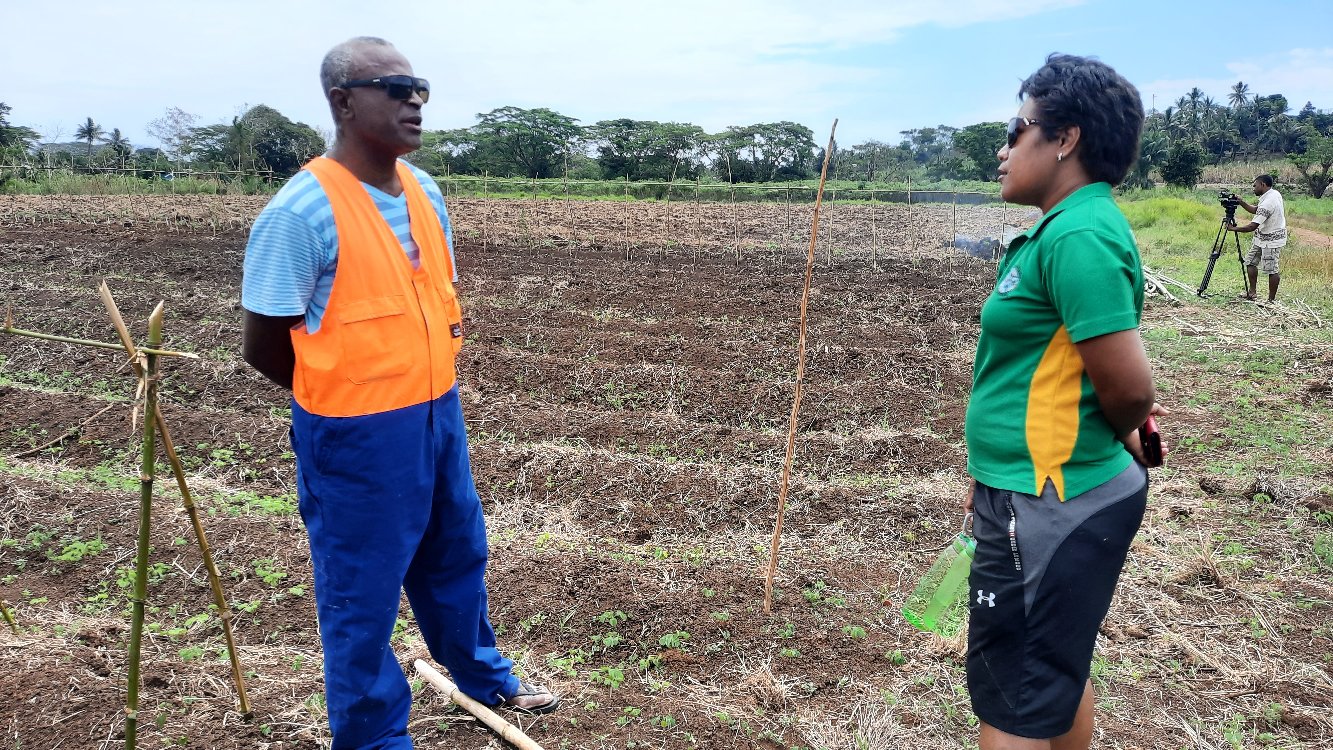Sweet and Rewarding Farming for Surveyor Turned Farmer

A certain kind of
acumen, self-discipline, and commitment are needed to develop a successful
career.
With over three
decades of experience as a surveyor, Timoci Qimaqima, 52, of Lauwaki Village,
Vuda in the Province of Ba, needed all of those qualities and more to
distinguish himself from his contemporaries in the land surveying fraternity.
But in 2020, when
the COVID-19 pandemic was at its worst and the Fijian economy virtually collapsed,
he had to take stock of his accomplishments on the personal and professional
fronts as well as the objectives he had set for himself. His newly discovered
path only led to one thing in particular, and he found his silver lining in
agriculture—specifically, yam farming.
With the express
purpose of bettering the lives of his family and kin, Mr. Qimaqima took it upon
himself to lease his own Mataqali land. "The land I am currently leasing
is approximately 23 acres. I worked as a surveyor for 32 years before quitting
in March 2020 because most businesses had closed.
"So I made the
decision to go back to my village to help my family's way of life by using the
land we had previously but had never been fully utilized for farming purposes.
This is why I started using this piece of land in March 2020, and I focused on
fully utilizing this land to support us during these difficult times,” he said.
As he considers his
time as an employee, he laments the time he could have otherwise dedicated to
such rewarding avenues as farming. Consequently, he has no regrets about
choosing to take up farming and abandoning his once preferred profession of
land surveying.
"We are all
aware that whether we work for the government or for a private company, we are
under supervision for eight hours each day. During my tenure as an employee, I
have learned and experienced this firsthand.
Previously, eight
hours of his day was spent doing supervised work, but he smiled and said,
"When I left the working environment and took up farming. I felt a huge
relief and a heavy burden was lifted off my shoulders."
Mr Qimaqima said,
"I manage my own time. I can decide when to wake up or when I can start my
farm work in a day. More importantly, when I am hungry, the food I eat is here
on my farm. When I was working, the majority of the time I bought my
food, but now, I eat what I plant, all right here from the farm that I am
on.
In order to provide
for his future generations and help them understand the value of owning and
utilizing land, he has laid out a plan to convert the land he currently farms
into a family estate.
I have a plan to put
up my children along this piece of land and have it as a family estate so that
they and their children can grow up to call this place their own. They can live
here and eat from it. To ensure that they can get everything they need right
here, I intend to plant fruit trees, banana and plantain trees along the edges,
and coconut trees all around the area.
"When there was
a family function like funerals or weddings for us to attend, something that
always challenged me was that there wasn’t a farm to help cater for these huge
family functions."
"Our family
members and mataqali always went to the markets to buy the produce even though
we had the land. I always kept a close watch on this piece of land and I had
laid a strategy to ensure that they no longer needed to go to the markets to
buy the vegetables and crops for these functions, but instead for us to grow
all the food needed for the traditional obligations and family functions
(funerals or weddings)," said Mr Qimaqima.
Additionally, he
boldly counseled his Mataqali's members to invest in land rather than keep
their money in a bank, in an effort to strengthen his Mataqali's investment
portfolio.
Going one step
further, he also made the most of his connections with the Yasawas by
purchasing a fiberglass boat and outboard motor for use by the fishermen of his
Mataqali, as well as for transporting people between the Yasawas and the
mainland.
And as he reflected
on his time spent working as a surveyor and now that he was reaping the
benefits of farming, he gave some words of wisdom to his fellow landowners,
advising them to use the land for their own gain.
"Since many of
our fellow Fijian from the maritime islands don't own land, unlike us here from
Viti Levu, I just wanted to offer some advice to landowners and those of us who
do. I see that many people from the maritime islands are eager to come to Viti
Levu and lease so they can cultivate it," he said.
"I would like
to address and implore the large land-owning units from the provinces of
Ba, Ra, and Nadroga to utilize our land well, in Tailevu, and throughout Viti
Levu in particular, because I believe that this will help to ease some of the
burdens and struggles that we face every day.
"Let's work on
the plot of land the Lord has given us and make the best possible use of
it," he said. "That's the word of wisdom I'd like to
impart."
-Ends-
